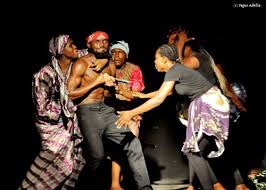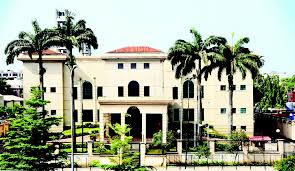As utility artist and administrator, Francesca Emanuel, dies at 86, AKEEM LASISI writes that her impact transcends her lifetime
Multitalented artist and iconic administrator, Mrs Francesca Emanuel, bid the stage farewell on Tuesday. With her passage in Lagos, the country’s pioneer federal permanent secretary, actress, singer, poet and arts patron can be said to have joined an irreplaceable league of cultured saints.
A long-time associate of Nobel laureate, Prof. Wole Soyinka, Emmanuel was an in-law to Macmillan Publishers Chairman, Chief Bode Emanuel. She was part of the genesis of the Soyinka theatrical enterprise and remained with the clan till the end. Even as she grew older, she would elegantly mount the podium at various arts fora. Her voice remained ever distinct as she was one of the few Nigerians who flaunted suave accents, so that when she spoke or read at events, every ear and mind submitted to the beauty of her elocution.
Some are, indeed, likely to recall that, based on the way Emanuel handled English language, she was in the class of the likes of slain Justice Minister, Chief Bola Ige; and legendary arts patron, the late Ambassador Segun Olusola. While Soyinka is in a class of its own, a former Commonwealth Secretary-General, Chief Emeka Anyaoku; and broadcaster-turned entrepreneur, Dr Christopher Kolade, are among the few classically-tongued still around.

Yet, Emanuel’s most institutionalised contribution to the growth of literature and other related genres in the latter years seems to be with the annual Macmillan Literary Night that featured readings, performances, lectures and exhibitions. The programme often held at the MUSON Centre, Onikan, Lagos, promoted talents, discovered new ones and rewarded them.
The MUSON itself is another co-legacy of the departed. The reason is that the Emanuel family is among the legends who founded the centre that is synonymous with classical music and played a major role in the growth of contemporary music and other arts in Nigeria. That Emanuel’s impact is, no wonder, so real is evident in the wave of tributes that her departure has started evoking. For instance, seasoned dancer and founder of the Crown Troupe of Africa, Segun Adefila, says she was so instrumental to the survival of many young people that she paid their school fees.

Adefila tells Phenomenal.com.ng: “I met her for the first time in 1999. That was at the National Theatre. Aremo Tope Babayemi had organised a concert and the Crown Troupe performed there. Mama Francesca was also there and saw us perform. She fell in love with our performance and, since then, she practically adopted us. In fact, I can say she made me her son and so much remained with us that she believed in the troupe even more than I do.”
Mourning her, seasoned actor and communicator, Ropo Ewenla, also notes in an online post: “Fare thee well, Mama Francesca. Exceptional soprano, great actor, first female perm sec.”
Publisher of ‘QED’, Olumide Iyanda, also recalls his encounter with Emanuel when she clocked 70. Then as a journalist with ‘Saturday Punch’, he had an interview with her, in the course of which she relived her involvement with the arts industry.
Iyanda says, “Nigeria lost a gem yesterday with the death of Mrs Francesca Emanuel (CON). She wasn’t just the country’s first female federal permanent secretary, she was also a matriarch of the arts. She excelled in everything from public administration to singing, acting and poetry. Her friends called her Franco. Those of us much younger called her Aunty Fran. She was mother to MUSON, NANTAP, NCF and many more. She lived gracefully and left this realm quietly.”
Former Commissioner for Tourism Arts and Culture in Lagos State, Mr Steve Ayorinde, also worked closely with Emanuel, especially when he was an arts and entertainment journalist, with a deep eye on MUSON. He recalls on Thursday that Emanuel never disguised her love for the stage, the studio, the TV and other arts channels to which she clung till she breathed her last. It is thus not surprising that she is prominently featured in Ayorinde’s book entitled Masterpieces.
He notes: “In my next life, I will not share music with the civil service. I will devote my life to the arts.’ This was how Aunty Francesca Yetunde Emanuel announced her disengagement from active music performance in September 2003, when her 70th birthday was celebrated with a fantastic classical music concert at the MUSON Centre, Lagos. She lived for almost 17 more years before transiting to eternal glory yesterday, Wednesday April 8 after a brief illness.
She was Nigeria’s first female Permanent Secretary, but was better known for her exemplary contributions to the arts, first as a member of Prof. Wole Soyinka’s Orisun Theatre and later as a performing member and patron of the Musical Society of Nigeria (MUSON).
“I had the privilege of interviewing Aunty Fran a few times and I did document several of her performances in my first book, Masterpieces: A Critic’s Timeless Reports (Spectrum Books, 2008). She was deeply creative, accommodating; a patriot, a lovely soul and an exceptional human being. The performing arts world will miss her dearly. But the heavens have just welcomed an angel back home. Adieu Sisi Yetunde. Sleep well…”
Commiserating with the family, President Muhammadu Buhari has also described her as a true patriot, amazon and administrator par excellence.

According to a statement signed by Special Adviser, Media, to the President, Malam Garba Shehu, Buhari recalled Emanuel’s many efforts to modernise the civil service and for offering her services and wealth of experience as member of several boards and governing councils of government establishments.
The President said he believed that Emanuel’s works would continue to be felt and honoured in the public service which she devotedly served as well as the arts, literary and fashion sectors where she excelled. He prayed to the almighty God to comfort the family, friends and associates of the deceased and grant her soul eternal rest.
The Dawn Commission, in a profile, puts some of the Emanuel’s exploits in perspective, saying Emanuel was a woman of many parts. Born on September 19, 1933, in Lagos to Francis Eugenio Aderinkoye Pereira, who was Chief Clerk in the Governor’s office, and Honoria Folashade Pereira (nee Caulcrick), a seamstress, she attended kindergarten classes at the Methodist Girls’ School, from 1938 to 1940; and primary school at Princess School, Lagos, from 1941 to 1945.
Relying on a perspective from the ‘Nigerian Women Pioneers & Icons’, the South-West development commission adds: “Thereafter, she gained admission to Holy Child College, Lagos in 1946. In 1952, after obtaining her Cambridge School Certificate in top grade, she was admitted to the University College, Ibadan (now University of Ibadan) where she studied Geography. In 1955, she obtained the Inter-B.A. after which she transferred to the University College, London for her main degree and graduated with a Bachelor of Arts (B.A): Honours degree in Geography in 1959. Mrs. Emanuel had her professional career largely in the civil service. She went through the whole gamut of the various arms of the Federal Civil Service. She started as Assistant Secretary, Federal Ministry of Works and Housing, 1959-1960, becoming, by this appointment, the first indigenous female Administrative Officer in the Federal Civil Service.
“Between 1960 and 1961, she was at the Federal Ministry of Establishment from where she was transferred to the Police Affairs Division in the Cabinet Office from 1961 to 1964. In recognition of her outstanding performance, she was appointed Senior Assistant Secretary, Secretariat of the Morgan Commission of Nigerian Workers, in 1964; Under-Secretary, Federal Ministry of Commerce and Industry, 1964 to 1969; Deputy-Secretary, Federal Ministry of Works and Housing, 1969-1973; she also served as Principal Secretary, Cabinet Office, 1973 to 1974; and Secretary, Federal Public Service Commission, January to June, 1975.

“Administration, however, was not the only area in which she excelled as she performed equally brilliantly in other areas. A gifted singer, her talent in this field was nurtured right from childhood. She started off from the Sunday School and later enlisted with the Little Star Band of Hope Meeting of the Methodist Church, Olowogbowo. This explains her active participation in the music industry in Nigeria. It is worth noting that while still in secondary school, she won first prize as soloist in many concerts, most notable among which were as Soprano Solo at the first Nigerian Festival of the Arts in Lagos in 1950. She was also a remarkable actress as well as a member of the pioneer group known as the Steve Rhodes Voices, which featured in some of Wole sovinka’s earliest plays in the 1960s.”



